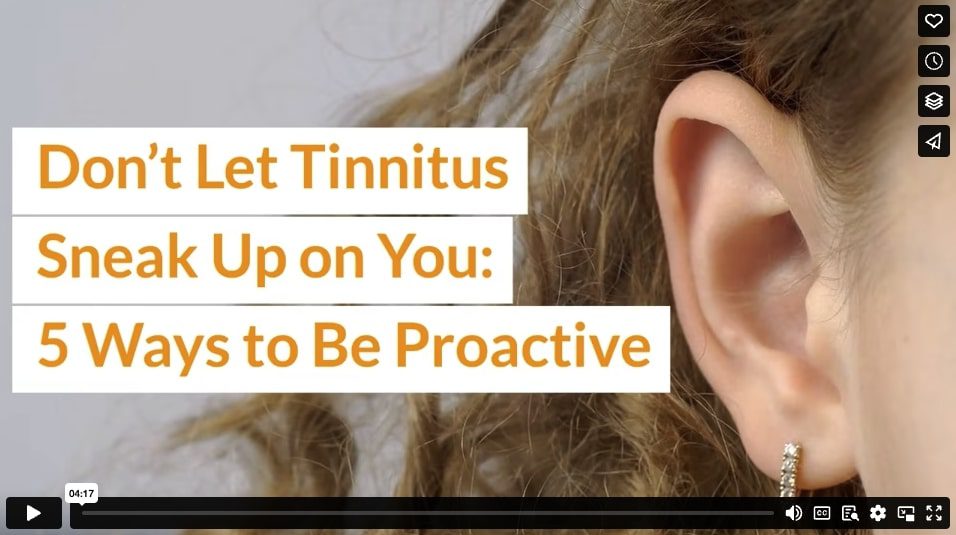By Barry Keate
Barry Keate, has lived with tinnitus over 40 years and has published 150+ research articles on numerous aspects of tinnitus. He is an expert on the condition and a well-known advocate for those with tinnitus.

(prostooleh/Freepik)
Between the hustle and bustle of traffic, the sounds of machinery in construction zones, music overhead and in our ears, household tools in the kitchen and yard, and even the playful sounds of children, the world we live in is full of sound stimulation. That means even when we don’t realize it, our ears are hard at work.
Sometimes, as in the case of many who are exposed to repetitive noises over time, be they loud or moderate, ears get overworked and overstimulated. Due to this overstimulation, we can start experiencing the annoying and potentially debilitating ringing of the ears called tinnitus.
Tinnitus can affect anyone, but there are simple and effective steps to improve one’s chances for a lifetime with healthy and tinnitus-free ears.
5 Tips to Prevent Tinnitus
1. Listen Safely
While some noise you hear is beyond your control, you do have the power to control your listening experiences when 1) listening to audio through headphones and 2) encountering anticipated loud noises.
Wearing headphones for extended periods of time for personal and professional reasons has become a universal experience. It’s important to take inventory of headphone volume to avoid any damage to the delicate cochlear hair cells within the ear canal. Instead of turning up the volume to override surrounding sounds, keep the volume at a low level and consider using closed captions when available or moving to a quieter location when possible.
Another great alternative is to use noise-canceling headphones, which allow listeners to hear clearly at a lower volume.
When engaging in activities with loud sounds, whether it be shooting guns, watching race cars, using power tools, or attending a concert, consider the factors that might be in your control. Limiting the time exposed to the sound by taking breaks and creating distance from the source of the sound, such as standing farther away from the loudspeaker can reduce your exposure. Also, wearing ear protection in the form of foam ear plugs or earmuffs is a great idea. When the situation calls for it, using multiple layers of protection will help you enjoy your experience and keep your ears happy.
2. Manage Stress
Stress affects so many aspects of our health, so it should come as no surprise that it has a direct impact on the health of the ear and can increase symptoms of tinnitus. Calming activities that help the body to relax can help reduce muscle flexion and the persistence of tinnitus caused by stress.
Even if you don’t experience tinnitus, managing stress is a great way to prevent the onset of tinnitus. Don’t wait for the arrival of an illness like tinnitus to practice relaxing and calming activities; consistent efforts to manage stress can dramatically improve your well-being over time.
3. Reduce Noise Pollution
Consider the sounds all around you that you have no control over hearing: the birds outside, the neighbors in an apartment building, construction outside your window, the lawnmower in the neighbor’s yard, the honking of cars on the road, and even the low humming sound of appliances at work in the home, such as the refrigerator. These sounds are mostly subtle enough to block out or notice only occasionally. However, when you listen to these things over time, they can crescendo into a kind of commotion that makes it hard to feel peace and clarity.
In order to reduce risks for tinnitus, you can take steps like shutting the windows or making sure to run the appliances when you are gone or in another room. On a regular basis, you should also create time and space for quiet and meditation in an environment with little to no sound.
4. Treat Earwax Buildup (the Right Way)
When earwax buildup creates pressure in the ear canal, it can cause nerve stimulation that resembles ringing in the ears. A simple way to prevent damage to the eardrum that can contribute to tinnitus development is to keep cotton swabs on the outside of the eardrum and use safe methods for clearing out excessive earwax buildup.
5. Prioritize Health
You may be surprised to learn that some factors that contribute to ear health and the prevention of tinnitus include prioritizing heart health, stopping smoking, keeping proper head posture, receiving adequate sleep, and maintaining a healthy diet. You’ve heard the importance of all of these things before, but when it comes to preventing tinnitus, these steps are key. Just think how much your ears will thank you for simple, daily efforts to improve your overall physical health.
The good news about tinnitus is that it’s preventable. For those who are living with tinnitus, there are ways to find relief, such as through herbal supplements for tinnitus. However, if you can embrace healthy habits now, you can lower your risk of developing tinnitus in the first place. Take these proactive steps now to prevent tinnitus and ensure a lifetime of happy hearing.
Video

Infographic
Repetitive exposure to loud or moderate noises can overwork and overstimulate the ears, leading to tinnitus. Discover five tips to prevent tinnitus in this infographic.

Get Free Shipping!
Order now and get free shipping on either the Tinnitus Starter Kit or Combo Pack. Try the doctor recommended products with clinically proven ingredients for tinnitus. No coupon code required.

